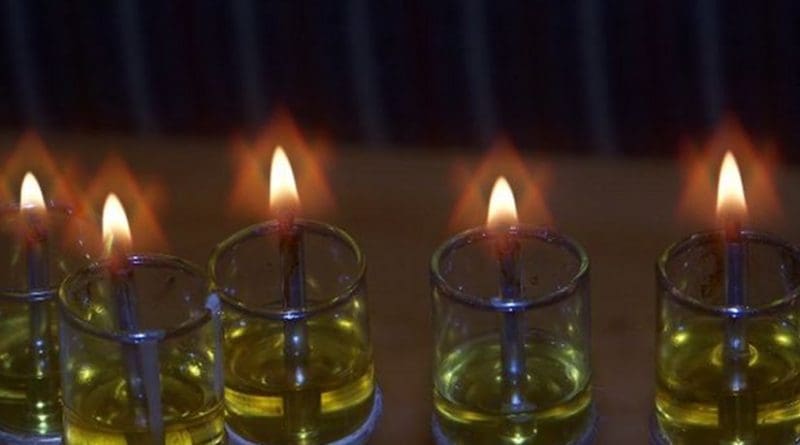Jewish Light For Iran’s Protesters – OpEd
The Jewish Holidays of Hanukah and Passover celebrate the liberation of an oppressed people against an oppressive government. Each day I offer my prayers for the brave women and men in Iran who have been protesting that a Kurdish women was beaten to death after being arrested by the Iranian morality police on 13 September for violating the Iran’s imposed dress code.
Protests in Iran have to this day expanded to at least 280 cities. Over 750 people have been killed and more than 30,000 arrested by the regime’s forces, according to sources of Iranian opposition People’s Mojahedin Organization of Iran (PMOI/MEK). The names of 601 killed protesters have been published by the PMOI/MEK.
Hanukkah often is referred to as the Festival of Lights because it teaches: Do not blame the Darkness; light a candle. The origin of this name goes back to the Jewish historian Josephus Flavius, who lived in Jerusalem and later in Rome during the first century of the Common Era.
In his history book Antiquities of the Jews, Josephus describes the origin of the holiday we now know as Hanukkah: “So Judah and his fellow citizens celebrated the festival of the restoration of the sacrifices in the Temple for eight days; and they honored [the one] God, and delighted themselves with singing psalms of praise and playing harps.
“Indeed, they were so very glad at the revival of their [religious] customs after so long a time [of oppression], having unexpectedly regained their right to worship, that they made it a law for their posterity that they should keep a festival celebrating the restoration of their Temple worship for eight days. “And from that time to this [about 250 years later] we celebrate what we call the Festival of Lights, because, it was beyond our hopes that this right [to worship] was brought to light, and so this name was placed on the festival.”
The 21st century connection of a government’s oppression of a group of its people in Iran is an re-enactment of an ongoing spiritual commitment of both Islam and Judaism to the ideal: Light can come out of Darkness.
The Passover Haggadah (a book that’s been revised, reprinted, and republished over 6,000 times, mostly in the last 200 years) states: Passover is a journey “from sorrow to joy, from mourning to festivity, from darkness to light, and from bondage to redemption”.
And the Qur’an states: “And We certainly sent Moses with Our signs, [saying], “Bring out your people from darknesses into light, and remind them of the days of Allah.” Indeed in that are signs for everyone patient and grateful.” (14:5) and “Allah is an ally of those who believe. He brings them out from darknesses into light.” (2:257)
This Light that comes out of Darkness is not natural light. It is the light of religious enlightenment. The 32 century old Biblical Holiday of Passover; and the 22 century old holiday of Hanukah; both embody the concept that it does not make any difference to the lamp if it is half full or half empty; but it makes all the difference to us humans in this world. As the Qur’an states: “Allah is an ally of those who believe. He brings them out from darkness into light.” (2:257)
The oppression of Judaism by Antiochus IV, the Syrian Greek king, was the world’s first known attempt at suppressing a minority religion, but unfortunately not the last. Other well known attempts were the three century long Roman persecution of Christianity, and the terrible persecution of Muhammad and his followers by the majority of the pagan Arabs in Makka.
All three religions emerged from their varying periods of persecution stronger than ever, and this is the theme of the ongoing spiritual lesson of the Hanukkah lamp that once lit by faithful believers, filled with hope and trust in God; lasts longer than anyone else thinks possible.
This is the ongoing spiritual commitment of both Islam and Judaism to the ideal: Light can even come out of Darkness.
As the Jewish family Passover Haggadah (a book that’s been revised, reprinted, and republished over 6,000 times, mostly in the last 200 years) states: Passover is a journey “from sorrow to joy, from mourning to festivity, from darkness to light, and from bondage to redemption”.
And the Qur’an states: “And We certainly sent Moses with Our signs, [saying], “Bring out your people from darkness into light, and remind them of the days of Allah. Indeed in that are signs for everyone patient and grateful.” (14:5)
The major text of the Jewish mystical Kabbalah tradition is the Zohar. In it there is a profound passage when “Rabbi Isaac said, “The primordial light created by God was hidden away until the world will be fragrant, and in total harmony. Until that world arrives, God’s light is stored and hidden away.”
But Rabbi Judah responded: “If the light were completely hidden, the world could not exist for even a moment! Rather, it is hidden and sown like a seed that every year sprouts seeds and fruits whereby the world is sustained. Every single day, a ray of that light shines into the world, keeping everything alive. With that ray [of light and hope] God feeds the whole world. (Zohar 1: 31b– 32a)
This Light that comes out of Darkness is not natural light. It is the light of positive, hopeful, faithful enlightenment which is now burning in Iran. It might be extinguished this year but the flames will always burn again.


Excellent and enlightening article. May God protect you. I also hope that the people of Iran will soon be freed from this medieval regime, so that all the people of Iran, from different ethnic groups and followers of different religions, can live together in peace and comfort.